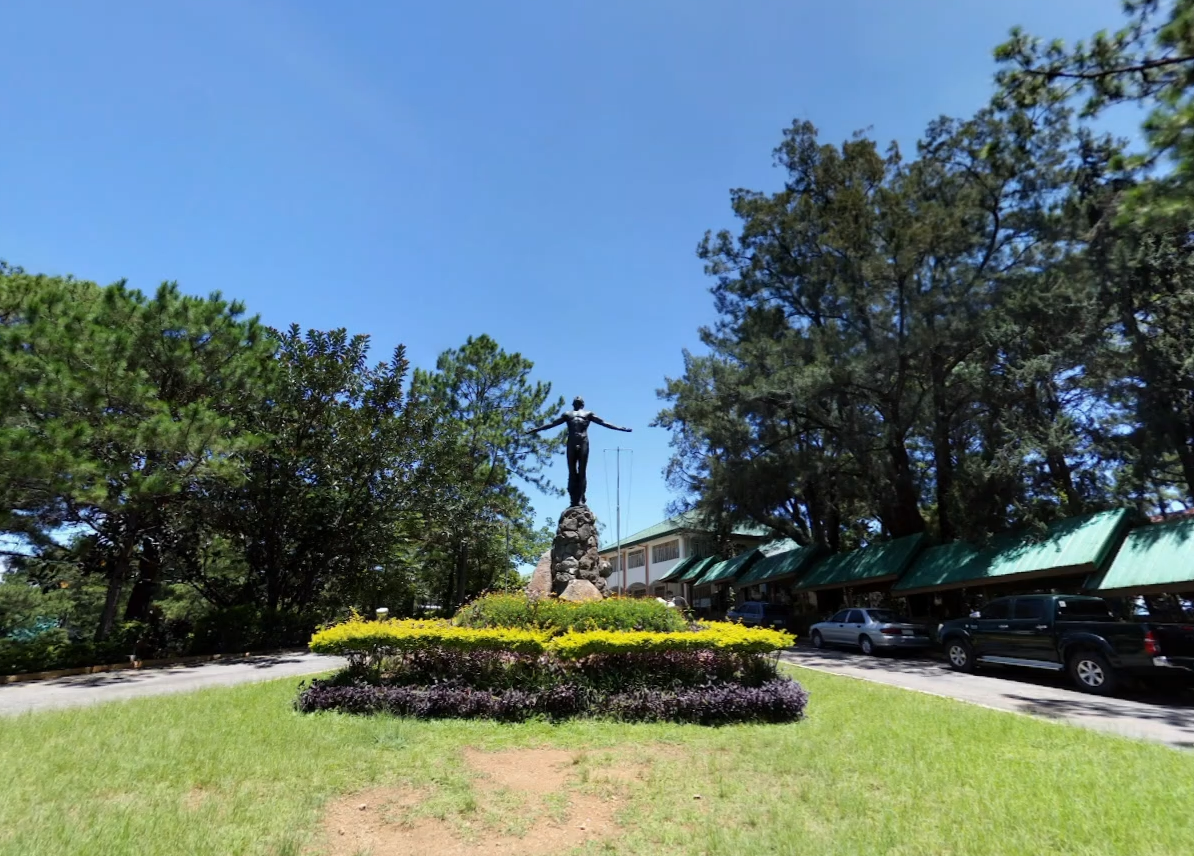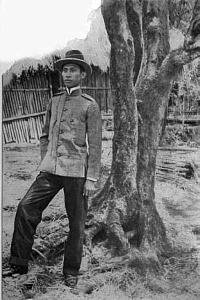|
Malayang Pagkakaisa Ng Kabataang Pilipino
Malayang Pagkakaisa ng Kabataang Pilipino ( Tagalog, "Free Union of Filipino Youth"), abbreviated MPKP was a youth organization in the Philippines. It was the youth and student wing of the pro-Soviet Partido Komunista ng Pilipinas-1930 (PKP). The MPKP was founded on November 30, 1967, as the PKP broke its links with the Kabataang Makabayan ("Patriotic Youth"). Whilst the KM developed a Maoist orientation under the leadership of Jose Maria Sison, the MPKP argued that protracted revolutionary war was not feasible considering the geography of the Philippines (a scattered archipelago, not bordering any socialist state). Some six hundred delegates took part in the founding congress of the MPKP, held in Cabiao, Nueva Ecija. The leading group of the MPKP had belonged to the KM in Central Luzon. Francisco Nemenzo Jr. was amongst the founders of the MPKP. As of 1970, the MPKP was estimated to have some 5,000 members, predominantly young peasants and rural workers. The MPKP published ''St ... [...More Info...] [...Related Items...] OR: [Wikipedia] [Google] [Baidu] |
Communism
Communism (from Latin la, communis, lit=common, universal, label=none) is a far-left sociopolitical, philosophical, and economic ideology and current within the socialist movement whose goal is the establishment of a communist society, a socioeconomic order centered around common ownership of the means of production, distribution, and exchange which allocates products to everyone in the society.: "One widespread distinction was that socialism socialised production only while communism socialised production and consumption." Communist society also involves the absence of private property, social classes, money, and the state. Communists often seek a voluntary state of self-governance, but disagree on the means to this end. This reflects a distinction between a more libertarian approach of communization, revolutionary spontaneity, and workers' self-management, and a more vanguardist or communist party-driven approach through the development of a constitutional socialist st ... [...More Info...] [...Related Items...] OR: [Wikipedia] [Google] [Baidu] |
Central Luzon
Central Luzon ( pam, (Reyun ning) Kalibudtarang Luzon, pag, (Rehiyon na) Pegley na Luzon, tgl, (Rehiyon ng) Gitnang Luzon, ilo, (Rehion/Deppaar ti) Tengnga ti Luzon), designated as Region III, is an administrative region in the Philippines, primarily serving to organize the 7 provinces of the vast central plains of the island of Luzon (the largest island), for administrative convenience. The region contains the largest plain in the country and produces most of the country's rice supply, earning itself the nickname "Rice Granary of the Philippines". Its provinces are: Aurora, Bataan, Bulacan, Nueva Ecija, Pampanga, Tarlac and Zambales. Pangasinan was formerly a province of Central Luzon before President Marcos signed ''Presidential Decree No. 1'', 1972, incorporating it into Ilocos Region. Additionally, the province of Aurora was part of the defunct political region Southern Tagalog when the region was divided into Calabarzon and Mimaropa, upon the issuance of ''Executive Ord ... [...More Info...] [...Related Items...] OR: [Wikipedia] [Google] [Baidu] |
Youth Wings Of Communist Parties
Youth is the time of life when one is young. The word, youth, can also mean the time between childhood and adulthood ( maturity), but it can also refer to one's peak, in terms of health or the period of life known as being a young adult. Youth is also defined as "the appearance, freshness, vigor, spirit, etc., characteristic of one, who is young". Its definitions of a specific age range varies, as youth is not defined chronologically as a stage that can be tied to specific age ranges; nor can its end point be linked to specific activities, such as taking unpaid work, or having sexual relations. Youth is an experience that may shape an individual's level of dependency, which can be marked in various ways according to different cultural perspectives. Personal experience is marked by an individual's cultural norms or traditions, while a youth's level of dependency means the extent to which they still rely on their family emotionally and economically. Terminology and definitio ... [...More Info...] [...Related Items...] OR: [Wikipedia] [Google] [Baidu] |
Youth Organizations Established In 1967
Youth is the time of life when one is young. The word, youth, can also mean the time between childhood and adulthood ( maturity), but it can also refer to one's peak, in terms of health or the period of life known as being a young adult. Youth is also defined as "the appearance, freshness, vigor, spirit, etc., characteristic of one, who is young". Its definitions of a specific age range varies, as youth is not defined chronologically as a stage that can be tied to specific age ranges; nor can its end point be linked to specific activities, such as taking unpaid work, or having sexual relations. Youth is an experience that may shape an individual's level of dependency, which can be marked in various ways according to different cultural perspectives. Personal experience is marked by an individual's cultural norms or traditions, while a youth's level of dependency means the extent to which they still rely on their family emotionally and economically. Terminology and definition ... [...More Info...] [...Related Items...] OR: [Wikipedia] [Google] [Baidu] |
Student Movement In The Philippines (1965–1972)
It was in the late 1960s and early 1970s that the Philippines saw a surge in student activism. This could be chalked up to the onset of the Ferdinand Marcos administration and its declaration of Martial Law, which bore witness to tens of thousands of human rights violations, among many others. There are, however, several factors and events in Philippine history that contributed to the increase in student activism during this period.“A History of the Philippine Political Protest,” Official Gazette. Accessed November 5, 2016. https://www.officialgazette.gov.ph/edsa/the-ph-protest/ In fact, economic decline, increase in unemployment rates, the growth of intra-elite conflicts, and internal dissension and disruption all factored into the context of student activism in the Philippines. It was around this time that businesses in Manila tried to find opportunities to withdraw when the city started to be deemed unsafe. Five Communist oriented guerrillas in the countryside had also regai ... [...More Info...] [...Related Items...] OR: [Wikipedia] [Google] [Baidu] |
Amnesty
Amnesty (from the Ancient Greek ἀμνηστία, ''amnestia'', "forgetfulness, passing over") is defined as "A pardon extended by the government to a group or class of people, usually for a political offense; the act of a sovereign power officially forgiving certain classes of people who are subject to trial but have not yet been convicted." Though the term general pardon has a similar definition, an amnesty constitutes more than a pardon, in so much as it obliterates all legal remembrance of the offense. Amnesty is increasingly used to express the idea of "freedom" and to refer to when prisoners can go free. Amnesties, which in the United Kingdom may be granted by the crown or by an act of Parliament, were formerly usual on coronations and similar occasions, but are chiefly exercised towards associations of political criminals, and are sometimes granted absolutely, though more frequently there are certain specified exceptions. Thus, in the case of the earliest recorded amnesty, ... [...More Info...] [...Related Items...] OR: [Wikipedia] [Google] [Baidu] |
Proclamation No
A proclamation (Lat. ''proclamare'', to make public by announcement) is an official declaration issued by a person of authority to make certain announcements known. Proclamations are currently used within the governing framework of some nations and are usually issued in the name of the head of state. A proclamation is (usually) a non-binding notice. A general distinction is made between official proclamations from states or state organs with a binding character and proclamations from political-social groups or organizations, both of which try to win over the mood of those addressed. In addition, the procedure of proclaiming the beginning of a rule over a certain ruling territory is called a proclamation. For example, on July 26, 1581, the Proclamation of Dutch Independence was signed which led to the creation of the Dutch Republic in 1588, formally recognized in 1648 by the Peace of Münster. The announcement of the intention to marry two people, the bidding, was referred to ... [...More Info...] [...Related Items...] OR: [Wikipedia] [Google] [Baidu] |
University Of The Philippines
The University of the Philippines (UP; fil, Pamantasan ng Pilipinas Unibersidad ng Pilipinas) is a state university system in the Philippines. It is the country's national university, as mandated by Republic Act No. 9500 (UP Charter of 2008), giving it institutional autonomy. Originally founded by the American colonial government on June 18, 1908, it was established through the ratification of Act No. 1870 of the 1st Philippine Legislature to serve as an "advanced instruction in literature, philosophy, the sciences and arts, and to give professional and technical training" to eligible students regardless of "age, sex, nationality, religious belief and political affiliation." The University of the Philippines system has 8 constituent universities (CUs): UP Diliman, which serves as the system's flagship university, UP Los Baños, UP Manila, UP Visayas, UP Open University, UP Mindanao, UP Baguio, and UP Cebu which are scattered across 17 campuses. Widely regarded and ... [...More Info...] [...Related Items...] OR: [Wikipedia] [Google] [Baidu] |
Ruben Torres (Filipino Politician)
Ruben Deloso Torres (born September 10, 1941 in Botolan, Zambales) is a politician in the Philippines. He goes by the nom de guerre "''Kadre''" which he was known as a leftist during martial law period. Life Torres was known as a student activist, then a leftist leader during and after martial law. Under President Corazon Aquino, he served as an undersecretary in the Department of Labor and Employment from 1989 to 1990. Afterwards he was promoted to full secretary, serving from 1990 to 1992. Under the next president, Fidel V. Ramos, he worked as executive secretary (colloquially known as the ''Little President'') from 1995 to 1998. He was instrumental in brokering a peace accord with the Muslim rebels in Mindanao. He later served as Congressman of the 2nd District of Zambales from 2001 to 2004 in the House of Representatives. He is currently the president of the Trade Union Congress of the Philippines and a columnist at The Manila Times. Autobiography Torres was portrayed by C ... [...More Info...] [...Related Items...] OR: [Wikipedia] [Google] [Baidu] |
1969 Philippine General Election
Presidential, legislative and local elections were held on November 11, 1969, in the Philippines. Incumbent President Ferdinand Marcos won an unprecedented second full term as President of the Philippines. Marcos was the last president in the entire electoral history who ran and won for a second term. His running mate, incumbent Vice President Fernando Lopez was also elected to a third full term as Vice President of the Philippines. An unprecedented twelve candidates ran for president, however ten of those were nuisance candidates. Results President Vice president Senate House of Representatives See also *Commission on Elections *Politics of the Philippines *Philippine elections *President of the Philippines * 7th Congress of the Philippines References External links Official website of the Commission on Elections {{DEFAULTSORT:Philippine General Election, 1969 1969 General election A general election is a political voting election where generally all or most ... [...More Info...] [...Related Items...] OR: [Wikipedia] [Google] [Baidu] |
Francisco Nemenzo Jr
Francisco is the Spanish and Portuguese form of the masculine given name ''Franciscus''. Nicknames In Spanish, people with the name Francisco are sometimes nicknamed "Paco". San Francisco de Asís was known as ''Pater Comunitatis'' (father of the community) when he founded the Franciscan order, and "Paco" is a short form of ''Pater Comunitatis''. In areas of Spain where Basque is spoken, "Patxi" is the most common nickname; in the Catalan areas, "Cesc" (short for Francesc) is often used. In Spanish Latin America and in the Philippines, people with the name Francisco are frequently called "Pancho". " Kiko" is also used as a nickname, and "Chicho" is another possibility. In Portuguese, people named Francisco are commonly nicknamed " Chico" (''shíco''). This is also a less-common nickname for Francisco in Spanish. People with the given name * Pope Francis is rendered in the Spanish and Portuguese languages as Papa Francisco * Francisco Acebal (1866–1933), Spanish writer and ... [...More Info...] [...Related Items...] OR: [Wikipedia] [Google] [Baidu] |
Nueva Ecija
Nueva Ecija, officially the Province of Nueva Ecija ( tgl, Lalawigan ng Nueva Ecija , also ; ilo, Probinsia ti Nueva Ecija; pag, Luyag/Probinsia na Nueva Ecija; Kapampangan: ''Lalawigan/Probinsia ning Nueva Ecija''), is a landlocked province in the Philippines located in the Central Luzon region. Its capital is the city of Palayan, while Cabanatuan, its former capital, is the largest local government unit (LGU). Nueva Ecija borders, from the south clockwise, Bulacan, Pampanga, Tarlac, Pangasinan, Nueva Vizcaya and Aurora. The province is nationally known as the ''Rice Granary of the Philippines'', producing the largest rice yield in the country. History Precolonial era These first settlers included tribes of Ilongots ( Egungot) or Italons, Abaca and Buquids. Settlements were built along the banks following the river's undulations. The Ilongots, meaning people of the forest, were the fierce headhunters and animist tribes who occupied Carranglan and the mountainous terrain of ... [...More Info...] [...Related Items...] OR: [Wikipedia] [Google] [Baidu] |





